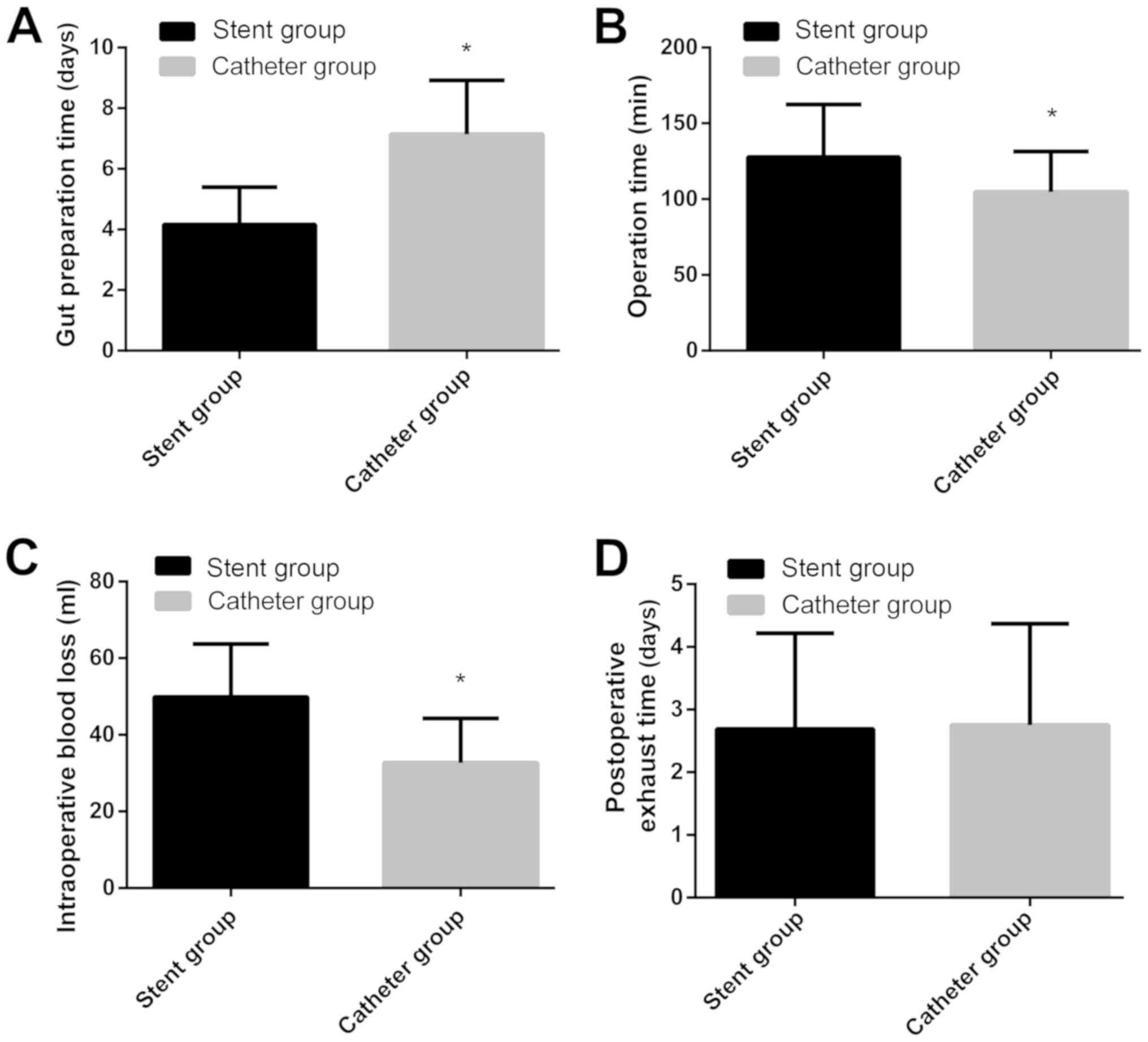|
1
|
Siegel RL, Miller KD, Fedewa SA, Ahnen DJ,
Meester RG, Barzi A and Jemal A: Colorectal cancer statistics,
2017. CA Cancer J Clin. 67:177–193. 2017. View Article : Google Scholar : PubMed/NCBI
|
|
2
|
Arnold M, Sierra MS, Laversanne M,
Soerjomataram I, Jemal A and Bray F: Global patterns and trends in
colorectal cancer incidence and mortality. Gut. 66:683–691. 2017.
View Article : Google Scholar : PubMed/NCBI
|
|
3
|
Takahashi H, Okabayashi K, Tsuruta M,
Hasegawa H, Yahagi M and Kitagawa Y: Self-expanding metallic stents
versus surgical intervention as palliative therapy for obstructive
colorectal cancer: A meta-analysis. World J Surg. 39:2037–2044.
2015. View Article : Google Scholar : PubMed/NCBI
|
|
4
|
Atsushi I, Mitsuyoshi O, Kazuya Y, Syuhei
K, Noriyuki K, Masashi M, Akira W, Kentaro S, Nobuyuki K, Natsuko
S, et al: Long-term outcomes and prognostic factors of patients
with obstructive colorectal cancer: A multicenter retrospective
cohort study. World J Gastroenterol. 22:5237–5245. 2016. View Article : Google Scholar : PubMed/NCBI
|
|
5
|
Kegler MC, Beasley DD, Liang S, Cotter M,
Phillips E, Hermstad A, Williams R, Martinez J and Riehman K: Using
the consolidated framework for implementation research to
understand safety net health system efforts to increase colorectal
cancer screening rates. Health Educ Res. 33:315–326. 2018.
View Article : Google Scholar : PubMed/NCBI
|
|
6
|
Baer C, Menon R, Bastawrous S and
Bastawrous A: Emergency presentations of colorectal cancer. Surg
Clin North Am. 97:529–545. 2017. View Article : Google Scholar : PubMed/NCBI
|
|
7
|
Khoo E, O'Neill S, Brown E, Wigmore SJ and
Harrison EM: Systematic review of systemic adjuvant, neoadjuvant
and perioperative chemotherapy for resectable colorectal-liver
metastases. HPB (Oxford). 18:485–493. 2016. View Article : Google Scholar : PubMed/NCBI
|
|
8
|
Kwak MS, Kim WS, Lee JM, Yang DH, Yoon YS,
Yu CS, Kim JC and Byeon JS: Does stenting as a bridge to surgery in
left-sided colorectal cancer obstruction really worsen oncological
outcomes? Dis Colon Rectum. 59:725–732. 2016. View Article : Google Scholar : PubMed/NCBI
|
|
9
|
Haraguchi N, Ikeda M, Miyake M, Yamada T,
Sakakibara Y, Mita E, Doki Y, Mori M and Sekimoto M: Colonic
stenting as a bridge to surgery for obstructive colorectal cancer:
Advantages and disadvantages. Surg Today. 46:1310–1317. 2016.
View Article : Google Scholar : PubMed/NCBI
|
|
10
|
Cézé N, Charachon A, Locher C, Aparicio T,
Mitry E, Barbieux JP, Landi B, Dorval E, Moussata D and Lecomte T:
Safety and efficacy of palliative systemic chemotherapy combined
with colorectal self-expandable metallic stents in advanced
colorectal cancer: A multicenter study. Clin Res Hepatol
Gastroenterol. 40:230–238. 2016. View Article : Google Scholar : PubMed/NCBI
|
|
11
|
Miłek T and Ciostek P: Implantation of a
new enteral stent in obstructive colorectal cancer using
interventional radiology in patients over 70 years of age.
Wideochir Inne Tech Malo Inwazyjne. 10:155–160. 2015.PubMed/NCBI
|
|
12
|
Kim EJ and Kim YJ: Stents for colorectal
obstruction: Past, present, and future. World J Gastroenterol.
22:842–852. 2016. View Article : Google Scholar : PubMed/NCBI
|
|
13
|
De Rosa M, Pace U, Rega D, Costabile V,
Duraturo F, Izzo P and Delrio P: Genetics, diagnosis and management
of colorectal cancer (Review). Oncol Rep. 34:1087–1096. 2015.
View Article : Google Scholar : PubMed/NCBI
|
|
14
|
Mattar RE, Al-Alem F, Simoneau E and
Hassanain M: Preoperative selection of patients with colorectal
cancer liver metastasis for hepatic resection. World J
Gastroenterol. 22:567–581. 2016. View Article : Google Scholar : PubMed/NCBI
|
|
15
|
Enomoto T, Saida Y, Takabayashi K, Nagao
S, Takeshita E, Watanabe R, Takahashi A, Nakamura Y, Asai K,
Watanebe M, et al: Open surgery versus laparoscopic surgery after
stent insertion for obstructive colorectal cancer. Surg Today.
46:1383–1386. 2016. View Article : Google Scholar : PubMed/NCBI
|
|
16
|
Yamada T, Okabayashi K, Hasegawa H,
Tsuruta M, Yoo JH, Seishima R and Kitagawa Y: Meta-analysis of the
risk of small bowel obstruction following open or laparoscopic
colorectal surgery. Br J Surg. 103:493–503. 2016. View Article : Google Scholar : PubMed/NCBI
|
|
17
|
Cetinkaya E, Dogrul AB and Tirnaksiz MB:
Role of self expandable stents in management of colorectal cancers.
World J Gastrointest Oncol. 8:113–120. 2016. View Article : Google Scholar : PubMed/NCBI
|
|
18
|
Zullig LL, Smith VA, Jackson GL, Danus S,
Schnell M, Lindquist J, Provenzale D, Weinberger M, Kelley MJ and
Bosworth HB: Colorectal cancer statistics from the veterans affairs
central cancer registry. Clin Colorectal Cancer. 15:e199–e204.
2016. View Article : Google Scholar : PubMed/NCBI
|
|
19
|
Shimizu H, Yamazaki R, Ohtsuka H, Osaka I,
Takuma K and Morita Y: Feasibility of laparoscopic surgery after
stent insertion for obstructive colorectal cancer. Asian J Endosc
Surg. 11:118–122. 2018. View Article : Google Scholar : PubMed/NCBI
|
|
20
|
Park SJ, Lee KY, Kwon SH and Lee SH:
Stenting as a bridge to surgery for obstructive colon cancer: Does
it have surgical merit or oncologic demerit? Ann Surg Oncol.
23:842–848. 2016. View Article : Google Scholar : PubMed/NCBI
|
|
21
|
Zhang N, Zhou ZL and Xie JL: Application
of transanal ileus tube in acute obstructive left-sided colorectal
cancer. Int J Clin Exp Med. 8:14024–14029. 2015.PubMed/NCBI
|















